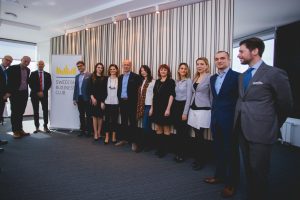In 2018, the SBC wants to present itself to the most important players among the Croatian policy makers and in the business community, and create a launch pad for future projects and initiatives by the end of the year .
The story of the newly established Swedish Business Club (SBC) starts with an initiative which came from the Swedish Prime Minister, Mr. Stefan Löfven at the meeting with the Croatian president, Ms. Kolinda Grabar Kitarović in March 2017. A few months later, ABB, Astra Zeneca, Bisnode, Ericsson Nikola Tesla, Ikea, Oriflame, Saab, Securitas and Tele2, as well as the Embassy of Sweden became the first members of the SBC. The decision was made quickly – says Katarina Fulir, President of the Swedish Business Club in Croatia, as „we all share the business culture that is deeply rooted in our Swedish identity – we all do our best to contribute to raising business standards in terms of innovation, we are all concerned with creating a sustainable economy, and we all “live” by the principles of equality and meritocracy

-
What was your main motive and goal when planning to launch the Club?
The foundation for such an organization was already set by the development of “Team Sweden” – a promotional platform that joins a number of Swedish public authorities and agencies with Swedish companies, and aims at coordinating promotional activities of Sweden.
The SBC is really the manifestation of Team Sweden in Croatia. Its purpose is to promote mutual benefits, closer industrial and economic cooperation, and establish additional links between Sweden and Croatia. Simultaneously, the Club will aim at consolidating “Brand Sweden”. According to a research, public perception of Sweden in Croatia is very favourable and Swedish companies benefit a lot from the country-of-origin. This perception is based on the values that Sweden, and in our case the Club, uphold, so the other members of the SBC can feel these favourable effects as well. In order to boost the benefit, the SBC also aims to strengthen the overall Swedish presence in Croatia. Of course, when we use the term ‘Swedish companies’, we mean Croatian companies which founding companies are of Swedish origin and which bring with themselves the strong corporate culture and values that can be used as a model for successful operations.
We believe that there is a lot of untapped potential when it comes to creating synergies in the activities of the Swedish companies operating in Croatia, especially because we have many things in common – our Swedish identity and the values that are at the core of who we are and how we do business. This then translates into similar general goals that we have. We are all dedicated to being socially responsible companies, offering same opportunities to all regardless of their gender, ethnical background or any other characteristic.

-
How many members does the Club have and what is their structure?
There are in total ten founding members which have only recently established the Club. As a next step, we plan to expand the membership to include other Swedish companies in Croatia, but also to other companies, institutions and individuals that are dedicated to and share the values that the SBC is based on.
The founding members of the Club are ABB, Astra Zeneca, Bisnode, Ericsson Nikola Tesla, Ikea, Oriflame, Saab, Securitas and Tele2, as well as the Embassy of Sweden. As you can see, our areas of operation, or our respective sectors, so to speak, are very diverse. Actually, they do not even overlap… However, we all share the business culture that is deeply rooted in our Swedish identity – we all do our best to contribute to raising business standards when it comes to innovation, we are all concerned with creating a sustainable economy, and we all “live” by the principles of equality and meritocracy.

-
When you talk about the Swedish investments in Croatia, do you have any information about their value so far and how many employees do Swedish companies in Croatia have? What is the structure of their investments?
In the period of the last 25 years, total Swedish investments in Croatia have amounted to close to €700 million. According to the relevant estimates, Swedish companies in Croatia employ over 6,000 people and have an annual turnover of approximately €500 million. Sectors that Swedish companies have invested in so far are diverse and range from ICT, telecoms, medicine and medical equipment, furniture to wood industry, cosmetics, infrastructure and many others.
-
How do your members rate the overall business environment here and where they see the potential for improving the existing institutional framework?
The most important thing for both new and current investors is having a stable and predictable regulatory environment. Reducing uncertainty to a minimum is essential for creating a conducive business environment, because it enables companies to develop long-term plans with a high degree of certainty. In such an environment the success or failure of your investment will depend on your own abilities and business prowess and not on the possible glitches in the system. The predictability of the work done by the official authorities is especially important because it often varies in terms of speed and clarity of implementation of rules. The rules, timelines and responsibilities must be clear, regardless of who implements them or where. This applies to the tax authorities, the local administration, as well as to the judiciary, which is still swamped with backlogs that slow the system down and do not contribute to a favourable business environment that is capable of attracting investments.
Also, procedures should be streamlined and para-fiscal fees should be reduced to make it easier for the investors to enter the market. Attracting investments is a competitive game that countries play against each other and investments flow to the areas of the lowest resistance. Therefore, it is in everybody’s best interest to have a simple and clear system that regulates investments and ensures a level playing field. When you have a competition-conducive environment, it will bring out the best in everyone while contributing to the prosperity.

5. How would you rate the overall economic situation in Croatia?
The economic situation is certainly better than it was several years ago. Croatian economy is growing, unemployment is decreasing, inflation is low, exports are on the rise and tourism is breaking records. State finances are also improving with the public debt continuing a downward slope and the budget deficit gap closing, as well. These are excellent developments, especially taking into consideration the fact that not too long ago Croatia was under the European Commission’s excessive deficit procedure. What is more important, most experts agree that this positive trend will continue over the coming years. It is very important that reforms are not neglected, especially in the pension insurance system and in the health care, which are facing some serious potential problems considering that Croatia has an aging population and a negative population growth. This is the flip side of things as these problems will determine the long-term sustainability of the economy. Sweden has faced such problems in the past, because it too had a well-educated population that migrated to other countries to look for higher paying jobs. Yet today, the country is one of the European countries with the highest birthrate, having the population exceeding the 10 million mark last year. Only a decade ago the Swedish population numbered only 8 million.
Therefore, it is important to continue developing an open and agile economy, while at the same time, investing into education and R&D that will enable Croatia to develop new industries and products to be sold in the global markets. This is what Sweden realized a long time ago – when you are too small to grow in your domestic market, you must look at things from a global perspective. The great thing is that one sees the shift in the approach in Croatia as well with many young companies, such as Rimac Automobili or Info Bip, doing exactly that.

6. What are your plans and projects for the following period?
At the moment, the SBC is probably the youngest business club in Croatia, and as newcomers we have set ourselves an ambitious plan to position and emancipate the Club very quickly. Actually, the establishment of the Club went quickly as well, because, as I already said before, the Swedish companies in Croatia really have a lot in common when it comes to our identity and the way we do business, so it is easy for us to agree.
Therefore, we view 2018 as the first year of operation, crucial for laying down the foundation for successful operation in the coming years. We have constituted the Club and now we have before us a period during which we need to build its position based on the comparative advantages of its membership, which we also plan to extend in the coming period. We will continue working on initiating partnerships with Croatian institutions and other similar associations that have the same goal of creating an increasingly better and more encouraging business climate. We also want to concretely establish the SBC’s public profile and to organize an event at which the Club will have its debut and where we will introduce ourselves to the important stakeholders, as well as current and future partners in Croatia. After gaining traction and gathering support for the Club’s initiatives we will be ready for laying the foundation of this first platform for Swedish – Croatian cooperation. The plan is, therefore, to have a business forum in the later part of 2018 as a crowning achievement, where we plan to assemble Swedish and Croatian companies, as well as different institutions and experts from both countries to exchange experiences, share the know-how, and find and develop concrete opportunities for cooperation. By the year end, if we continue in this manner, we will create a launch pad for the future projects and initiatives.